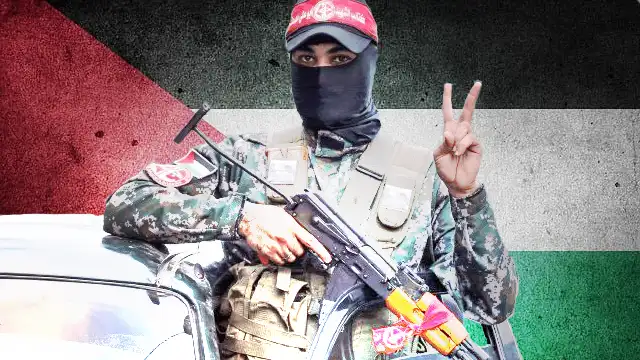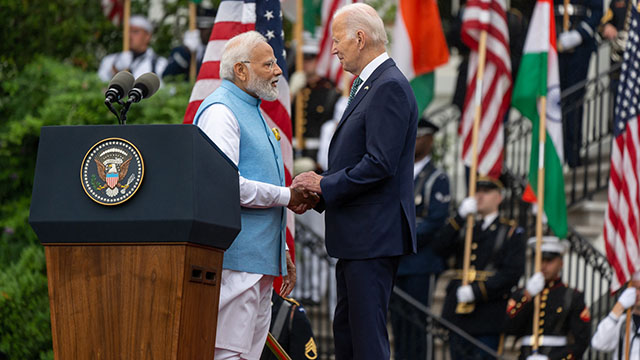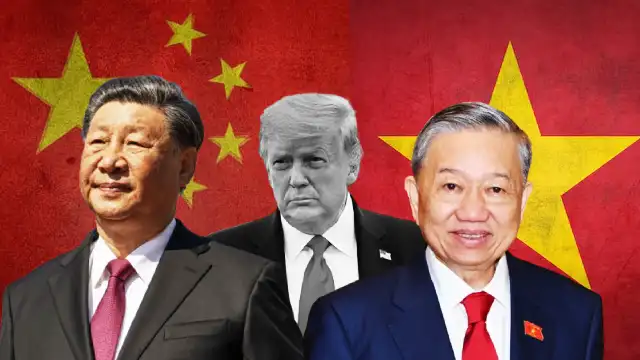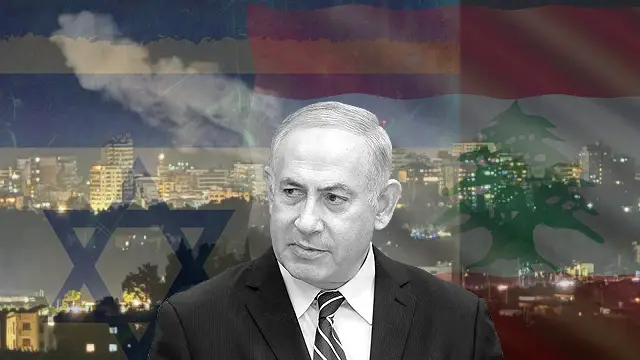The US-Israeli nexus has been blocking any genuine attempt to reach a ceasefire between the Palestinian resistance organisation Hamas and the Israel Defense Forces (IDF) in the Gaza Strip, the Palestinian resistance organisations allege. This comes at a time when Egypt’s attempt to broker a ceasefire deal between Hamas and Israel has found itself in a quagmire.
One of the major roadblocks to a ceasefire deal between Hamas and Israel is the latter’s demand for a complete disarmament of the resistance.
According to the Palestinian resistance, including the left-wing, nationalists and Islamists, the demand for disarmament is unacceptable.
The Follow-up Committee of National and Islamic Forces of Palestine issued a statement on Tuesday, April 15th, alleging that it has received a proposal for a truce that involves disarmament of the resistance and handing over of prisoners to the Israelis without any genuine guarantee for peace.
“The Follow-up Committee of National and Islamic Forces has monitored the news regarding the new proposal for a ceasefire, which includes a clause for the disarmament of the resistance and the handing over of zionist captives to the occupation without any genuine guarantees for ending the war of genocide against our people and for the complete withdrawal from the Gaza Strip,” the statement read.
In this context, the Committee affirmed four vital points in its statement.
“We reject the logic that exaggerates the primitive weapon victim, which is intended solely for self-defence, at a time when the United States announces the delivery of a large shipment of lethal weapons and heavy bombs—which are being dropped on the heads of our defenceless people—to the occupation,” the Committee stated.
The Committee highlighted the unique role of the Gaza Strip as a barrier between Egypt and Israel.
“The Gaza Strip represents a security zone for the Arab Republic of Egypt and separates it from the enemy of the Arab nation,” it said.
“The people of the strip represent the vanguard of Egypt’s army and its primary guardian, and Egypt constitutes a strategic depth for the Palestinians,” the Committee added.
It warned against political traps laid by the US-Israel nexus under the garb of a truce.
The Committee highlighted that Israel has a record of violating agreements.
“Any truce that lacks genuine guarantees for ending the war, ensuring a complete withdrawal, lifting the siege, and undertaking reconstruction will be a political trap that legitimises the occupation rather than resisting it,” the Committee asserted.
“Mediators and the international community must exert pressure on the zionist occupation, which has historically been known to renege on all agreements and understandings,” it demanded.
According to the Committee, the disarmament campaign is a deceptive operation to weaken the victims.
“A massive deception operation is underway by focusing on the issue of disarming the victim, while the core problem lies in the occupation’s failure to implement the three-phase agreement—which the Palestinian side agreed to and committed to,” the Committee said.
It concluded the statement saying, “Even the zionist community itself recognises that it is Netanyahu who has sabotaged the ceasefire agreement amid lethal international collusion and silence.”
Disarmament proposal from Israel
Earlier, the Hamas delegation that went to Egypt to work on a ceasefire deal left Cairo to return to Doha after receiving a new Israeli proposal for a ceasefire.
According to Palestinian resistance sources, the new proposal document included the demand to release 10 Israeli prisoners in exchange for Palestinian prisoners and a 45-day ceasefire.
The resistance claimed that Israel has “agreed to hold negotiations for a permanent ceasefire during this 45-day period, after previously refusing to budge on this matter.”
According to the resistance, the new proposal doesn’t guarantee a permanent ceasefire, but they expect it can at least help in starting a dialogue for a ceasefire deal between Hamas and Israel.
Hamas previously required the conclusion of the permanent ceasefire talks during the temporary truce period.
The 45-day period in the new proposal includes opening the crossings and the entry of aid into Gaza, but under Israeli conditions.
Further, the proposal stipulates the redeployment of the IDF in Gaza to its pre-March 2nd levels, the resistance claimed.
The talks for a permanent ceasefire deal between Hamas and Israel are expected to take place under this proposal.
Although Hamas has put the condition of permanent withdrawal of the IDF from the Gaza Strip, the US-Israel nexus insists on disarming Hamas and controlling the Gaza Strip through a third party.
Palestinian resistance informed that though Hamas has not yet responded to the proposal, they are expected to respond soon.
A Hamas leader, Mahmoud Mardawi, has told Al-Jazeera that the proposal includes the release of half of the Israeli prisoners it holds in the first week itself, a 45-day truce in exchange for entry of food, aid and shelter and an explicit mention of disarming Palestinian resistance.
“We are preparing a response to the mediators regarding the latest ‘israeli’ proposal after coordinating with the rest of the factions,” Mr Mardawi told Al-Jazeera
According to Al-Jazeera, Mr Mardawi claimed that they were informed in Egypt that “there will be no ceasefire agreement without negotiating the disarmament of the resistance”.
Hamas has responded that the path to any agreement is the cessation of aggression and withdrawal, not weapons, which “belong to the Palestinian people”.
Al-Jazeera claimed that the Hamas leader has affirmed that discussing the issue of the resistance’s weapons is completely unacceptable and that the resistance’s weapons are a fundamental right of the Palestinian people that will not be discussed.
“The resistance’s weapon is the life of the Palestinian people, and it cannot be compromised,” Mr Mardawi has claimed, adding, “We will not negotiate over the weapons, nor over those who carry the weapons, at any stage.”
He stressed that disarming the resistance is “an exclusively ‘israeli’ proposal, not an Egyptian one”.
Meanwhile, Hamas’s military wing, Martyr Izz El-Din Al-Qassam Brigades, announced on Tuesday that they have lost contact with a unit guarding an IDF prisoner, Edan Alexander, an American-Israeli.
No disarmament but ‘national-consensus government’: Hamas says
The head of International Relations at Hamas, Hussam Badran, has also rejected talks about disarmament as a condition for a ceasefire between Hamas and Israel.
“The movement has never demanded sector‑specific benefits or special privileges at any stage of negotiations; its sole concern has always been to relieve the suffering of the Palestinian people,” Mr Badran claimed during an interview with Al-Araby Al-Jadeed.
Discussing the disarmament proposal for a ceasefire deal between Hamas and Israel, Mr Badran said, “The movement categorically rejects any proposal calling for the disarmament of the resistance. Such demands are unhelpful in resolving the crisis and out of step with an acceptable national vision.”
He highlighted how Hamas and other resistance factions are working on the ‘national-consensus’ government, a proposal promoted by China, which hosted different Palestinian resistance organisations in Beijing last year.
“Hamas is working to form a national‑consensus government to administer both the Gaza Strip and the West Bank without factional quotas, and it is fully prepared to hand over Gaza’s administration once a national agreement is reached,” Mr Badran said, indicating a tectonic shift in Palestinian political realities.
“Hamas has put forward a proposal to establish a National Support Committee—coordinated with other Palestinian factions and comprising 40 national figures with no Hamas representation—as a genuine step toward overcoming internal Palestinian division,” Mr Badran added.
For the Hamas leader, the principal issue right now is to resolve the humanitarian crisis that has engulfed the people of Gaza.
“The precise administrative structure is not the main issue; what matters most is ending Gaza’s humanitarian suffering and easing the effects of the aggression,” he said.
Disarmament demand isn’t limited to ceasefire deal between Hamas and Israel
The US-Israel nexus doesn’t only need the disarmament of Hamas and other Palestinian outfits, including left-wing organisations like the Popular Front for the Liberation of Palestine, but it also wants the disarmament of the entire “Axis of Resistance” led by Iran.
According to reports, the US, which exerts great influence on the Lebanese Army and general-turned-President Joseph Aoun, has been demanding a total disarmament of the resistance organisation Hezbollah.
As the Hezbollah guerrillas have left the southern parts of Lebanon bordering occupied Israeli territories following the ceasefire agreement with Israel, the pressure is on Mr Aoun to disarm the resistance and to ensure that only the US-controlled Lebanese Army controls all weapons in the country.
According to Hezbollah, this will significantly weaken Lebanese resistance against Israel, which earlier had occupied its territories.
Hezbollah has so far remained consistent in the stance that it won’t disarm.
In Iraq, Reuters reports that Prime Minister Mohammed Shia al-Sudani is negotiating with Iran-backed Shi’ite militias, from the Kataib Hezbollah, Nujabaa, Kataib Sayyed al-Shuhada and Ansarullah al-Awfiyaa groups, to disarm them and ensure only the US-controlled Iraqi Army remains the only armed unit of the state.
Both Hezbollah and Iraqi resistance organisations have fired rockets at Israel following the latter’s attack on Gaza.
The militia groups, including Hezbollah, had also played a major role in resisting and defeating the CIA-funded Islamic State terrorists between 2014 and 2019, especially at the peak of the Syrian Civil War.
While until 2024 the Iran-led Axis of Resistance managed to combat the US-Israel nexus in the region, the situation changed drastically, following the mysterious death of former Iranian president Ebrahim Raisi in May 2024.
With the election of a moderate Dr Massoud Pezeshkian, who wants rapprochement with the West, and the octogenarian Supreme Leader Ayatollah Ali Khamenei’s deteriorating health conditions, Iran gradually retreated from confronting Israel, especially after an Israeli strike killed a top Hamas leader in Tehran.
After Israel assassinated Hassan Nasrallah, the iconic Hezbollah leader, and wiped out a large number of fighters of the organisation through pager blasts and incessant bombings targeting Lebanon, the Axis of Resistance suffered a major blow.
Finally, the collapse of the Bashar al-Assad-led Syrian government paved the way for the US-Israel-Turkey-NATO entente to consolidate their grip on the region and marginalise the resistance.
As only Yemen’s Houthi rebels continue to fight the US-Israel nexus, it has become quite easy for the latter to dictate their disarmament terms to all organisations.
The way forward for ceasefire between Hamas and Israel
Tel Aviv’s conditions show that a new ceasefire deal between Hamas and Israel may not be possible.
The obstinate position of Israel on disarmament also shows that it’s not interested in a truce right now, as US President Donald Trump’s administration won’t force it to stop the aggression.
Mr Trump, during his two meetings with Israeli Prime Minister Benjamin Netanyahu, has stated his goal—acquiring Gaza for real estate development purposes.
The American president’s plan entails the total eviction of Palestinians from Gaza, and Washington DC will now force the neighbouring Arab countries, including its allies like Egypt, Jordan, Saudi Arabia, etc, to accommodate 2.1m Gazans.
As no Arab government would accept the proposal, as many of them have stated, the US will ensure that Israel intensifies its attacks on Gaza, so that the increase in the death toll may compel the Arab monarchies to change their stance.
Amid this situation, it’s highly unlikely that a new ceasefire deal between Hamas and Israel can materialise with the condition of the resistance’s disarmament. This logjam, created by Israel at the behest of the US, will prolong Gaza’s Palestinian people’s sufferings and agony for a long time, the present situation and equations indicate.







